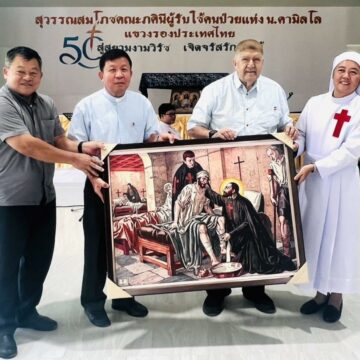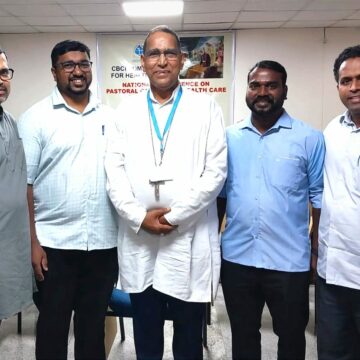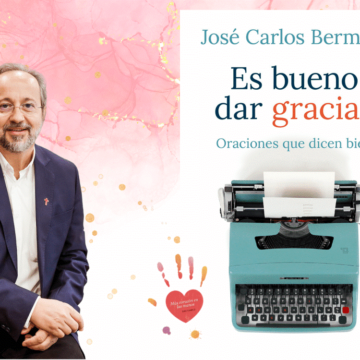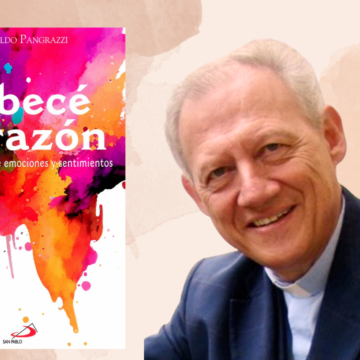Comforted and guided by the seven gifts of the Holy Spirit, we will now seek to achieve a better understanding of the delicate task of ‘advising the doubtful’. Doubt refers to a state of uncertainty in which a person finds himself or herself. It is the condition of a person who does not know how to choose; who hesitates and remains in suspense because he or she does not have a clear and certain vision of things. In a doubtful person, the problems of life make themselves felt in an overwhelming way and this make that person weak, insecure and for this reason exposed to every kind of risk. The life of a doubtful person, unfortunately, oscillates dangerously between fear and anxiety, creating a situation of real suffering.
We moderns have elevated doubt to a method. Above all ever since Descartes in his Meditations Methaphisique made doubt become a key to possessing secure knowledge. To flee from uncertainties, the Bishop of Hippo, St. Augustine, exhorted us to return to within ourselves, to our inner selves, to be able to draw near to truth: ‘It is not truth that reaches itself through reasoning; rather, those who use reason search for truth’. To explain this insight in a better way, he wrote one of the pages that would become an insuperable point of reference in the history of thought: ‘If what I say is not clear to you and you doubt that it is true, at least see that you do not doubt that you doubt it; and, if you are certain you doubt, look for the reason why you are certain…anyone who understands that they are doubting, understands the truth and also that what they understand is certain; therefore they are certain of the truth’ (De vera Religione, 39,73). And for his part Pascal added: ‘One should know how to doubt when this is necessary, affirm when this is necessary, and subordinate oneself when this is necessary. There are people who err with these three principles or when affirming that everything is apodictic, because they do not understand demonstration; or, when doubting everything, because they do not know to whom to subordinate themselves; or when subordinating themselves completely, because they do not know when one must judge’ (288). These words are valuable because they express at the same time the force of reason, both when it becomes master through doubt and when it knows how to accept its limitation of not being able to go further.
 At this point the word of God comes to us and offers us the identikit of a true counsellor: ‘But stay constantly with a godly man whom you know to be a keeper of the commandments, whose soul is in accord with your soul, and who will sorrow with you if you fail’ (Sir 37:12). It is no accident, however, that this sacred text finishes its description with going back to within oneself to find the way of truth: ‘And establish the counsel of your own heart, for no one is more faithful to you than it is. For a man’s soul sometimes keeps him better informed than seven watchmen sitting high on a watchtower. And besides all this pray to the Most High that he may direct your way in truth’ (Sir 37:13-15).
At this point the word of God comes to us and offers us the identikit of a true counsellor: ‘But stay constantly with a godly man whom you know to be a keeper of the commandments, whose soul is in accord with your soul, and who will sorrow with you if you fail’ (Sir 37:12). It is no accident, however, that this sacred text finishes its description with going back to within oneself to find the way of truth: ‘And establish the counsel of your own heart, for no one is more faithful to you than it is. For a man’s soul sometimes keeps him better informed than seven watchmen sitting high on a watchtower. And besides all this pray to the Most High that he may direct your way in truth’ (Sir 37:13-15).
The search for truth, therefore, is a duty of charity and nearness to the doubtful is a responsibility that those people who love cannot refuse to offer. One understands why the Church sees it as a work of mercy. For this reason, we must be near to the doubtful and establish with them a dialogue so that truth can take form; the mind can be illuminated; and the will can become capable of choosing. If, then, the doubt, which is so to speak existential, concerns the contents of a person’s faith, the loving counsel that one should offer him or her will be that of making that person understand that faith is not a set of abstract and theoretical truths that should be blindly accepted. It is, rather, a person to be welcomed and loved – Jesus who rose again, the Way, the Truth and the Life. It is he whom that person should love, abandoning himself or herself to the arms of his mercy. To employ the words of St. Anselm: ‘those who believe, experience God and thus have the certainty of His truth’. Thus those who are engaged in the mission of counselling, must perform that mission not with the arrogance of a person who has already reached the truth, but, rather, with the passion and the wish to look for it together, albeit knowing that faith has been received as a gift. And since ‘faith comes from listening’ (Ro 10:17), is it advisable that those who are called to give advice know how to take full advantage of the suggestions of the Holy spirit who speaks to the heart in silence and ‘intercedes for us with sighs too deep for words’ (Ro 8:26). Nor should we forget that we should be convinced that the source of many doubts is the father of lies, who infiltrates minds in very many ways: arrogance, pride, an unbridled longing for freedom, various suggestions, and, not least, seduction by people of other religions and sects.
All baptised people have the task of advising the doubtful: from the Pope to bishops and on to priests, sisters and the ordinary faithful. Personally, I remember my mother who, although she had only attended school to the third elementary level, supported by prayer, by the sacraments, by an assiduous reading of the Bible, and by the spiritual direction of the parish priest, at night wrote long letters to her brothers and sisters who were all evangelists, confuting their errors. She did this, however, after praying for a long time to the Holy Spirit from whom she always asked light and advice. Even for the small decisions that she had to take, she always said ‘let’s say a novena for the Holy Spirit so that we will be illuminated by him and make good and wise choices’.
Therefore, to make this work of mercy operational, and taking advantage, as well, of the great gift of the Holy Year, it is to be hoped that parishes and religious communities will open centres for listening. By now very many people no longer go to confession, they do not go to church, but they would be happy to find a priest or a person of faith who has time to listen to the doubts and the anxieties that torment their lives. How valuable, for example, is the centre for listening at the Basilica of St. Anthony in Padua, open from 15.00 to 18.00 every day. Fr. Claudio explains that ‘people turn to us who ask for clarifications about faith, who have doubts about some specific point. The young and the less young, men and women, can find here listening and comfort. Then we are called on by those who are oppressed by problems connected with their families and affections. There are many depressed people who come to us in a desperate state, with a feeling of emptiness and uselessness. We also at times meet people who suffer from authentic obsessions. But the most recurrent problems are clearly family problems and situations of loneliness, which is much more widespread than is thought, above all in cities. But every story, which remains absolutely secret, is one of a kind; no one person is the same as another’. Thus, encouraged and stimulated by this precious witness, let us open the doors of our churches, but above all else let us open the doors of our hearts, in order to welcome those people who are distant and lost, searching for a light, for a hope, for advice that frees them from fears and remorse!
A second approach can be provided by spiritual direction which leads to the reviewing and conversion of lives, to the exercise of faith and prayer, to sacramental and ecclesial life, and to discernment in the search for one’s own vocation and the duties that it involves.
Lastly, in the field of pastoral care in health, many doubts arise in the minds and on the lips of the sick, especially if they are incurable, about the meaning of illness, the suffering of innocent children, pain and death. Helping them lovingly to clear up doubts and anxieties, in the light of Christ who was crucified and rose again, is a great gift and a precious act of charity. As Pope Francis has beseeched us, we do not leave them on their own. May it never happen that in looking for help they find nobody ready to listen to them: ‘But when I look there is no one; among these there is no counsellor who, when I ask, gives an answer’ (Isaiah, 41:28)!















Camillians on Facebook
Camillians on Twitter
Camillians on Instagram